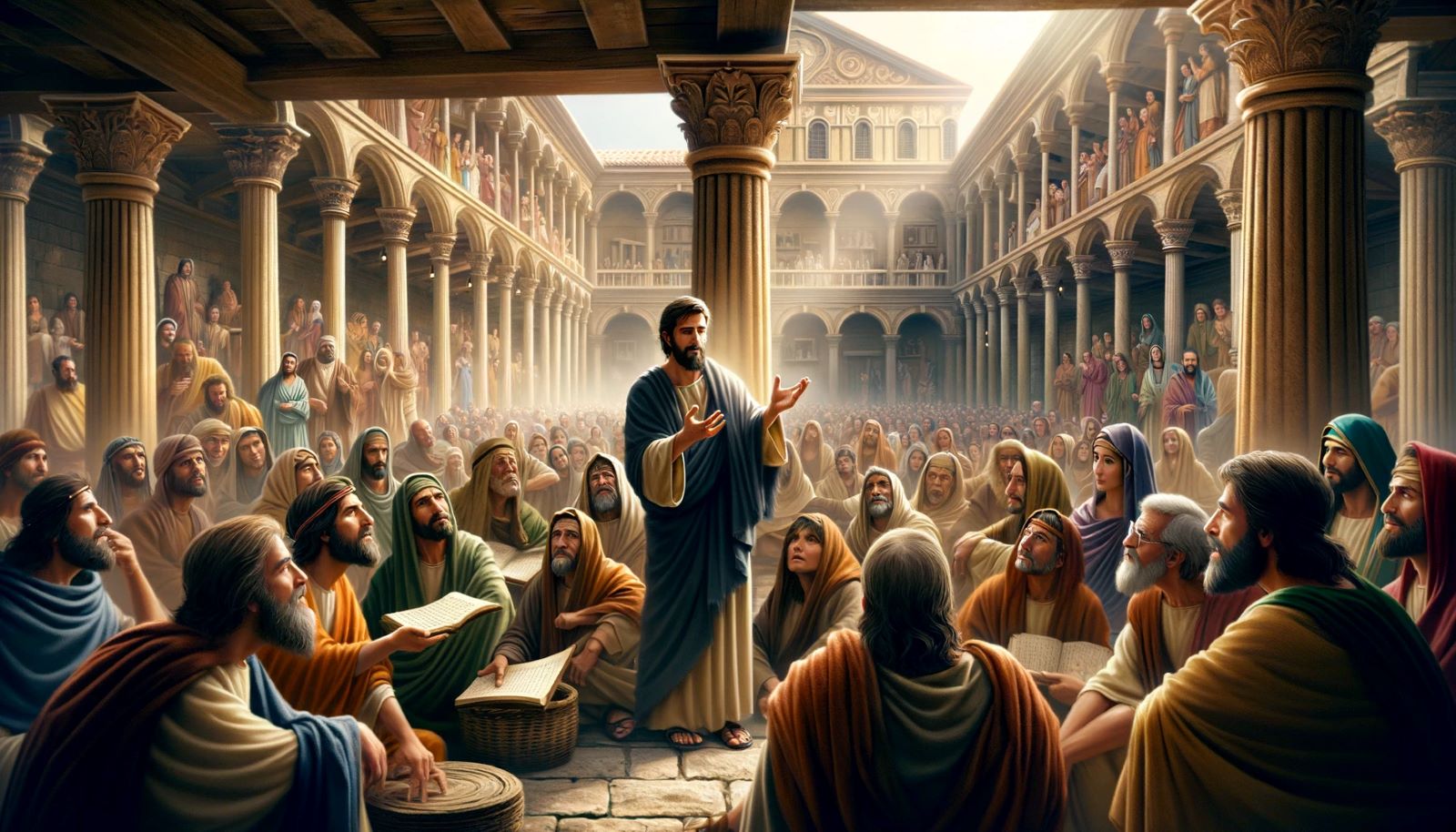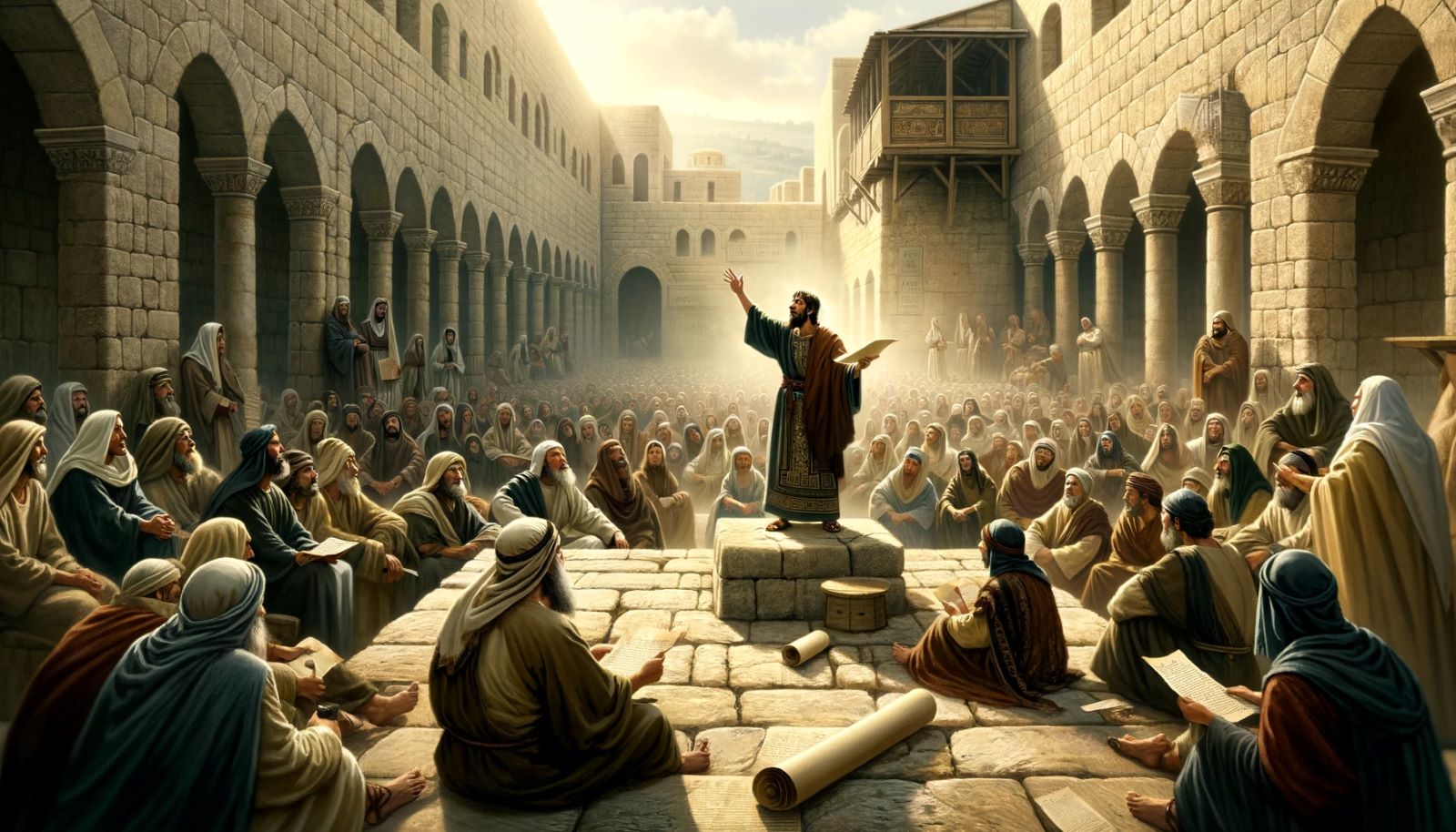Home>Bible Facts>Who Are The Original 12 Apostles


Bible Facts
Who Are The Original 12 Apostles
Published: February 22, 2024
Jason DeRose, Managing Editor at Christian.net, uses his expertise in religion and journalism to deepen understanding of faith's societal impacts. His editorial leadership, coupled with a strong academic background, enriches the platform’s diverse content, earning him recognition in both journalism and religious circles.
Discover the fascinating history and significance of the original 12 apostles in the Bible. Uncover intriguing Bible facts about these influential figures.
(Many of the links in this article redirect to a specific reviewed product. Your purchase of these products through affiliate links helps to generate commission for Christian.net, at no extra cost. Learn more)
Table of Contents
Introduction
The Original 12 Apostles, also known as the Twelve Disciples, were a group of individuals chosen by Jesus Christ to spread his teachings and carry on his ministry. These apostles played a pivotal role in the establishment and early growth of Christianity, and their names are deeply ingrained in the history and teachings of the faith.
As we delve into the lives and contributions of these remarkable individuals, we gain insight into the profound impact they had on the world and the enduring legacy they left behind. Each apostle possessed unique qualities and experiences, and their collective journey reflects the diverse tapestry of human nature and faith.
Through their unwavering dedication and sacrifices, the Original 12 Apostles laid the foundation for the global spread of Christianity, shaping the beliefs and practices of countless individuals across different cultures and generations. Their stories continue to inspire and resonate with people from all walks of life, serving as a testament to the enduring power of faith and the transformative influence of spiritual conviction.
Join us on a captivating exploration of the lives and legacies of the Original 12 Apostles, as we uncover the profound significance of their roles in the early Christian movement and the timeless relevance of their teachings in today's world.
Read more: What Is The Original Apostles Creed?
Peter
Peter, originally known as Simon, was a prominent figure among the Original 12 Apostles. He was a fisherman by trade and resided in the town of Capernaum, situated on the northern shore of the Sea of Galilee. Peter's given name, Simon, was later changed to Peter by Jesus, signifying his role as the "rock" upon which the Christian church would be built.
One of the most compelling aspects of Peter's character was his unwavering devotion to Jesus. He was among the first individuals called by Jesus to become a disciple, and his journey with Christ was marked by moments of profound faith and human fallibility. Peter's impulsive nature often led him to speak and act before fully comprehending the implications of his words and actions. This was evident when he boldly declared his allegiance to Jesus, stating that he would never deny him, only to later deny him three times during the events leading up to the crucifixion.
Despite his shortcomings, Peter's steadfast commitment to Jesus was unwavering. He witnessed numerous miracles performed by Jesus, including the raising of Jairus' daughter and the transfiguration on the mount. Additionally, Peter was present during pivotal moments such as the Last Supper and the Garden of Gethsemane, where he struggled to stay awake as Jesus prayed.
After Jesus' resurrection, Peter played a central role in the early Christian community. He emerged as a bold and influential leader, fearlessly proclaiming the message of Christ despite facing persecution and opposition. Peter's preaching on the day of Pentecost, which resulted in the conversion of thousands, exemplified his transformation from a humble fisherman to a charismatic evangelist.
Peter's enduring legacy is reflected in his letters, known as First and Second Peter, which are included in the New Testament. These epistles offer profound insights into Christian living, perseverance in the face of adversity, and the hope found in Christ. Peter's writings continue to inspire and guide believers, emphasizing the importance of faith, humility, and unwavering devotion to the teachings of Jesus.
Peter's remarkable journey exemplifies the transformative power of faith and the profound impact of personal encounters with the divine. His experiences serve as a testament to the resilience of the human spirit and the capacity for redemption and spiritual growth. Peter's legacy endures as a source of inspiration and guidance, reminding believers of the enduring strength found in embracing the teachings of Christ and embodying unwavering faith in the face of adversity.
Andrew
Andrew, the brother of Simon Peter, was a pivotal figure among the Original 12 Apostles. Prior to his calling as a disciple, Andrew was a fisherman by trade, working alongside his brother on the shores of the Sea of Galilee. His encounter with Jesus marked a transformative turning point in his life, leading him to embark on a profound journey of faith and discipleship.
One of the defining characteristics of Andrew was his role as an enthusiastic and proactive bringer of good news. Following his initial encounter with Jesus, Andrew wasted no time in sharing his newfound faith with others. His fervent belief in Jesus' identity as the Messiah led him to introduce his brother, Simon Peter, to Jesus, an act that would ultimately shape the course of Christian history. Andrew's willingness to share the message of Christ exemplifies the spirit of evangelism and the profound impact of personal testimony in spreading the teachings of Jesus.
Throughout his time as an apostle, Andrew demonstrated unwavering dedication to Jesus' ministry. He witnessed firsthand the miracles performed by Jesus, including the feeding of the five thousand and the healing of the sick. Andrew's steadfast presence during these transformative moments underscored his commitment to supporting and learning from the teachings and actions of Jesus.
Andrew's legacy extends beyond his role as a devoted disciple. His missionary endeavors and evangelistic zeal left an indelible mark on the early Christian movement. Following Jesus' ascension, Andrew embarked on a mission to share the gospel, traveling to various regions to proclaim the message of salvation. His bold and unwavering commitment to spreading the teachings of Jesus exemplifies the enduring impact of dedicated discipleship and the transformative power of faith.
Tradition holds that Andrew's missionary journeys took him to the regions of Scythia and Greece, where he fearlessly preached the gospel, ultimately facing persecution and martyrdom for his unwavering faith. His willingness to endure hardship and persecution for the sake of the gospel serves as a testament to the depth of his conviction and the enduring legacy of his commitment to Christ's teachings.
Andrew's influence transcends time and place, as his legacy continues to inspire believers to embrace the call to share the message of Christ with boldness and conviction. His life exemplifies the profound impact of personal testimony and the transformative power of faith in shaping the course of human history. Andrew's unwavering dedication to Jesus' ministry and his fervent commitment to spreading the gospel stand as a timeless example of the enduring impact of dedicated discipleship and the transformative power of faith.
James, son of Zebedee
James, the son of Zebedee, was one of the original 12 apostles chosen by Jesus Christ. Alongside his brother John, he was part of the inner circle of disciples who shared intimate moments with Jesus, including witnessing the transfiguration and the raising of Jairus' daughter. James' prominent role among the apostles is evident in his inclusion in pivotal events, reflecting his close relationship with Jesus and his deep commitment to the ministry.
James' journey as a disciple was marked by moments of profound spiritual growth and transformation. His initial occupation as a fisherman, working alongside his father Zebedee, underscores the humble beginnings from which he was called to a higher purpose. When Jesus extended the invitation to follow him, James wholeheartedly embraced the call, leaving behind his livelihood to embark on a transformative journey of faith and discipleship.
As a member of the inner circle, James was privy to unique experiences that deepened his understanding of Jesus' teachings and mission. The transfiguration, where Jesus' divine nature was revealed in a radiant display, offered James and his fellow disciples a glimpse of the extraordinary nature of their master. This profound encounter left an indelible impression on James, reinforcing his unwavering commitment to Jesus' ministry and solidifying his faith in the face of future challenges.
James' steadfast dedication to Jesus was further exemplified in his willingness to endure persecution and hardship for the sake of the gospel. His boldness in the face of adversity and his unwavering commitment to spreading the message of Christ reflect the depth of his conviction and the enduring impact of his discipleship. James' resilience in the face of persecution serves as a testament to the transformative power of faith and the unwavering resolve of those called to proclaim the gospel.
Tragically, James' life was cut short when he became the first apostle to be martyred for his faith. His unwavering commitment to Jesus' teachings and his willingness to endure persecution and suffering stand as a timeless example of the enduring impact of dedicated discipleship and the transformative power of faith. James' legacy continues to inspire believers to embrace the call to discipleship with courage and conviction, serving as a testament to the enduring strength found in unwavering faith and commitment to the teachings of Christ.
John
John, often referred to as the beloved disciple, holds a significant place among the Original 12 Apostles. His close relationship with Jesus and his profound contributions to the early Christian movement have left an enduring legacy that continues to inspire believers across the globe.
One of the most distinctive aspects of John's journey as a disciple was his deep bond with Jesus. His intimate connection with the Son of God was evident in the pivotal moments they shared, including the Last Supper, where John reclined close to Jesus, and the events surrounding the crucifixion, during which Jesus entrusted the care of his mother, Mary, to John. These intimate interactions underscored the depth of trust and affection between John and Jesus, highlighting the profound nature of their relationship.
John's role as the beloved disciple extended beyond his close companionship with Jesus. He was a witness to numerous miracles and teachings, gaining unique insights into the divine nature of Christ and the transformative power of his message. John's Gospel stands as a testament to his deep understanding of Jesus' identity as the Word made flesh, emphasizing the eternal significance of Christ's teachings and the promise of salvation through faith in him.
Following Jesus' resurrection and ascension, John emerged as a prominent figure in the early Christian community. His unwavering commitment to spreading the gospel and nurturing the fledgling church exemplified his dedication to continuing the work of Christ. John's pastoral care and profound theological insights were reflected in his writings, particularly in the Gospel of John, the three epistles bearing his name, and the Book of Revelation. These texts continue to offer profound spiritual guidance and theological depth, shaping the beliefs and practices of believers throughout the ages.
John's enduring legacy is further exemplified in his role as a pillar of the early church. His leadership and unwavering commitment to the teachings of Jesus played a pivotal role in shaping the theological foundation of Christianity. His emphasis on love, unity, and the eternal significance of Christ's sacrifice continues to resonate with believers, serving as a timeless source of inspiration and guidance.
The profound impact of John's life and teachings transcends time and place, offering believers a compelling example of unwavering faith, deep spiritual insight, and a profound commitment to the message of Christ. His enduring legacy serves as a testament to the transformative power of discipleship and the timeless relevance of embracing the teachings of Jesus with unwavering conviction and love.
Read more: Who Are The Apostles Of Today
Philip
Philip, one of the original 12 apostles chosen by Jesus Christ, played a significant role in the early Christian movement. His journey as a disciple was marked by moments of profound faith, unwavering dedication, and a steadfast commitment to spreading the teachings of Jesus.
Upon being called by Jesus to follow him, Philip wholeheartedly embraced the invitation, leaving behind his previous life to embark on a transformative journey of discipleship. His initial encounter with Jesus, during which he invited Nathanael to meet the Messiah, exemplified his fervent belief in the identity of Jesus as the fulfillment of the scriptures. Philip's enthusiastic proclamation, "We have found the one Moses wrote about in the Law, and about whom the prophets also wrote—Jesus of Nazareth, the son of Joseph," reflects his deep conviction and eagerness to share the message of Christ with others.
Throughout his time as an apostle, Philip witnessed numerous miracles and teachings of Jesus, gaining profound insights into the divine nature of his master and the transformative power of his message. His unwavering commitment to Jesus' ministry was evident in his presence during pivotal moments, including the feeding of the five thousand and the profound dialogue with Jesus regarding the Father.
Philip's enduring legacy is reflected in his unwavering commitment to spreading the gospel beyond the immediate confines of the Jewish community. His encounter with the Greek-speaking seekers, who expressed their desire to see Jesus, underscores his willingness to embrace diversity and extend the message of Christ to a broader audience. This pivotal interaction serves as a testament to Philip's vision of inclusivity and his dedication to sharing the transformative message of Jesus with all who sought the truth.
Tradition holds that Philip's missionary endeavors extended to regions beyond the borders of Judea, reflecting his bold and unwavering commitment to spreading the gospel. His willingness to endure hardship and persecution for the sake of the gospel stands as a timeless example of the enduring impact of dedicated discipleship and the transformative power of faith.
Philip's life and teachings continue to inspire believers to embrace the call to discipleship with courage and conviction, serving as a testament to the enduring strength found in unwavering faith and commitment to the teachings of Christ. His unwavering dedication to Jesus' ministry and his fervent commitment to spreading the gospel stand as a timeless example of the enduring impact of dedicated discipleship and the transformative power of faith.
Bartholomew
Bartholomew, also known as Nathanael, was a significant figure among the Original 12 Apostles chosen by Jesus Christ. His journey as a disciple was marked by moments of profound faith, unwavering dedication, and a steadfast commitment to spreading the teachings of Jesus.
Bartholomew's initial encounter with Jesus, as recorded in the Gospel of John, offers a compelling insight into his character and his fervent belief in the identity of Jesus as the Messiah. When Philip extended the invitation to meet Jesus, Bartholomew expressed skepticism, questioning whether anything good could come from Nazareth. However, upon meeting Jesus, he was profoundly impacted by the words of Christ, who saw him under the fig tree before Philip called him. This transformative encounter led Bartholomew to declare, "Rabbi, you are the Son of God; you are the king of Israel." This pivotal moment underscored his unwavering faith and his recognition of Jesus' divine nature.
Throughout his time as an apostle, Bartholomew bore witness to numerous miracles and teachings of Jesus, gaining profound insights into the transformative power of his message. His unwavering commitment to Jesus' ministry was evident in his presence during pivotal moments, including the feeding of the five thousand and the profound dialogue with Jesus regarding the Father.
Bartholomew's enduring legacy is reflected in his unwavering commitment to spreading the gospel beyond the immediate confines of the Jewish community. His willingness to embrace diversity and extend the message of Christ to a broader audience exemplified his vision of inclusivity and his dedication to sharing the transformative message of Jesus with all who sought the truth.
Tradition holds that Bartholomew's missionary endeavors extended to regions beyond the borders of Judea, reflecting his bold and unwavering commitment to spreading the gospel. His willingness to endure hardship and persecution for the sake of the gospel stands as a timeless example of the enduring impact of dedicated discipleship and the transformative power of faith.
Bartholomew's life and teachings continue to inspire believers to embrace the call to discipleship with courage and conviction, serving as a testament to the enduring strength found in unwavering faith and commitment to the teachings of Christ. His unwavering dedication to Jesus' ministry and his fervent commitment to spreading the gospel stand as a timeless example of the enduring impact of dedicated discipleship and the transformative power of faith.
Thomas
Thomas, also known as Didymus, holds a significant place among the Original 12 Apostles chosen by Jesus Christ. His journey as a disciple was marked by moments of profound faith, unwavering dedication, and a steadfast commitment to spreading the teachings of Jesus.
One of the most distinctive aspects of Thomas' character was his unwavering commitment to seeking truth and understanding. His initial skepticism following the resurrection of Jesus, where he expressed doubt regarding the accounts of his fellow disciples, serves as a testament to his analytical nature and his insistence on experiencing the truth firsthand. This pivotal moment, often referred to as "Doubting Thomas," underscores Thomas' deep desire for authentic encounters with the divine and his refusal to accept secondhand testimony.
Thomas' unwavering commitment to seeking truth was further exemplified in his profound declaration upon encountering the risen Christ. When Jesus appeared to the disciples, Thomas was invited to touch the wounds of the crucifixion, leading him to proclaim, "My Lord and my God!" This transformative encounter underscored Thomas' profound faith and his recognition of the divine nature of Jesus, solidifying his unwavering commitment to the teachings and mission of Christ.
Throughout his time as an apostle, Thomas bore witness to numerous miracles and teachings of Jesus, gaining profound insights into the transformative power of his message. His unwavering commitment to Jesus' ministry was evident in his presence during pivotal moments, including the Last Supper and the interactions with the disciples following the resurrection.
Thomas' enduring legacy is reflected in his unwavering commitment to spreading the gospel and nurturing the fledgling church. His willingness to endure hardship and persecution for the sake of the gospel stands as a timeless example of the enduring impact of dedicated discipleship and the transformative power of faith.
Thomas' life and teachings continue to inspire believers to embrace the call to discipleship with courage and conviction, serving as a testament to the enduring strength found in unwavering faith and commitment to the teachings of Christ. His unwavering dedication to Jesus' ministry and his fervent commitment to spreading the gospel stand as a timeless example of the enduring impact of dedicated discipleship and the transformative power of faith.
Matthew
Matthew, also known as Levi, was a pivotal figure among the Original 12 Apostles chosen by Jesus Christ. His journey as a disciple was marked by moments of profound transformation, unwavering dedication, and a steadfast commitment to spreading the teachings of Jesus.
Prior to his calling as a disciple, Matthew was a tax collector, a profession that often carried negative connotations due to its association with collaboration with the Roman authorities and exploitation of fellow Jews. However, when Jesus extended the invitation to follow him, Matthew wholeheartedly embraced the call, leaving behind his previous life to embark on a transformative journey of faith and discipleship.
One of the most compelling aspects of Matthew's character was his willingness to extend hospitality and share the message of Christ with others. Following his encounter with Jesus, Matthew hosted a banquet in his home, inviting fellow tax collectors and sinners to meet Jesus. This pivotal moment underscored Matthew's fervent belief in the transformative power of Christ's message and his commitment to reaching out to those marginalized by society.
Throughout his time as an apostle, Matthew bore witness to numerous miracles and teachings of Jesus, gaining profound insights into the transformative power of his message. His unwavering commitment to Jesus' ministry was evident in his presence during pivotal moments, including the Sermon on the Mount and the interactions with the disciples following the resurrection.
Matthew's enduring legacy is reflected in his Gospel, which stands as a testament to his deep understanding of Jesus' teachings and the eternal significance of his mission. The Gospel of Matthew offers profound insights into the identity of Jesus as the fulfillment of the scriptures, emphasizing the universal scope of Christ's message and the promise of salvation through faith in him. Matthew's Gospel continues to inspire and guide believers, offering timeless wisdom and spiritual nourishment.
Tradition holds that Matthew's missionary endeavors extended to regions beyond the borders of Judea, reflecting his bold and unwavering commitment to spreading the gospel. His willingness to endure hardship and persecution for the sake of the gospel stands as a timeless example of the enduring impact of dedicated discipleship and the transformative power of faith.
Matthew's life and teachings continue to inspire believers to embrace the call to discipleship with courage and conviction, serving as a testament to the enduring strength found in unwavering faith and commitment to the teachings of Christ. His unwavering dedication to Jesus' ministry and his fervent commitment to spreading the gospel stand as a timeless example of the enduring impact of dedicated discipleship and the transformative power of faith.
Read more: Who Are The Apostles Today
James, son of Alphaeus
James, son of Alphaeus, was a significant figure among the Original 12 Apostles chosen by Jesus Christ. His inclusion in the group of apostles reflects his unwavering commitment to the teachings and mission of Jesus, as well as his pivotal role in the early Christian movement.
While James, son of Alphaeus, is mentioned in the lists of the apostles in the Gospels, his specific contributions and experiences are not extensively documented in the New Testament. Despite the limited details available about his individual journey, James, son of Alphaeus, played a crucial role in the collective mission of the apostles to spread the message of Christ.
As an apostle, James, son of Alphaeus, bore witness to the transformative teachings and miracles performed by Jesus. His steadfast presence during pivotal moments, such as the Sermon on the Mount and the interactions with the disciples following the resurrection, underscores his unwavering commitment to Jesus' ministry and his dedication to learning from the profound wisdom imparted by the Son of God.
James, son of Alphaeus, exemplified the spirit of dedicated discipleship, embracing the call to follow Jesus with courage and conviction. His willingness to endure hardship and persecution for the sake of the gospel stands as a timeless example of the enduring impact of committed faith and the transformative power of discipleship.
While the specific details of James, son of Alphaeus' individual contributions may be less prominent in historical accounts, his collective role as an apostle and his unwavering commitment to the teachings of Jesus serve as a testament to the enduring strength found in dedicated discipleship. His life and legacy continue to inspire believers to embrace the call to discipleship with courage and conviction, serving as a timeless example of the enduring impact of unwavering faith and commitment to the teachings of Christ.
In summary, James, son of Alphaeus, stands as a compelling example of the transformative power of faith and the enduring impact of dedicated discipleship. His unwavering commitment to Jesus' ministry and his fervent dedication to spreading the gospel serve as a timeless testament to the enduring strength found in embracing the teachings of Christ with unwavering conviction and love.
Thaddaeus
Thaddaeus, also known as Judas, son of James, was a significant figure among the Original 12 Apostles chosen by Jesus Christ. His inclusion in the group of apostles reflects his unwavering commitment to the teachings and mission of Jesus, as well as his pivotal role in the early Christian movement.
While Thaddaeus is mentioned in the lists of the apostles in the Gospels, his specific contributions and experiences are not extensively documented in the New Testament. Despite the limited details available about his individual journey, Thaddaeus played a crucial role in the collective mission of the apostles to spread the message of Christ.
As an apostle, Thaddaeus bore witness to the transformative teachings and miracles performed by Jesus. His steadfast presence during pivotal moments, such as the Sermon on the Mount and the interactions with the disciples following the resurrection, underscores his unwavering commitment to Jesus' ministry and his dedication to learning from the profound wisdom imparted by the Son of God.
Thaddaeus exemplified the spirit of dedicated discipleship, embracing the call to follow Jesus with courage and conviction. His willingness to endure hardship and persecution for the sake of the gospel stands as a timeless example of the enduring impact of committed faith and the transformative power of discipleship.
While the specific details of Thaddaeus' individual contributions may be less prominent in historical accounts, his collective role as an apostle and his unwavering commitment to the teachings of Jesus serve as a testament to the enduring strength found in dedicated discipleship. His life and legacy continue to inspire believers to embrace the call to discipleship with courage and conviction, serving as a timeless example of the enduring impact of unwavering faith and commitment to the teachings of Christ.
In summary, Thaddaeus stands as a compelling example of the transformative power of faith and the enduring impact of dedicated discipleship. His unwavering commitment to Jesus' ministry and his fervent dedication to spreading the gospel serve as a timeless testament to the enduring strength found in embracing the teachings of Christ with unwavering conviction and love.
Simon the Zealot
Simon the Zealot, also known as Simon the Cananaean, was a significant figure among the Original 12 Apostles chosen by Jesus Christ. His inclusion in the group of apostles reflects his unwavering commitment to the teachings and mission of Jesus, as well as his pivotal role in the early Christian movement.
One of the most distinctive aspects of Simon's background was his association with the Zealots, a political movement characterized by fervent opposition to Roman rule and a commitment to the liberation of the Jewish people. This affiliation underscores the complex socio-political landscape of the time and Simon's potential exposure to revolutionary ideologies. Despite this background, Simon's encounter with Jesus marked a transformative turning point in his life, leading him to embrace a path of spiritual discipleship and a commitment to the teachings of Christ.
As an apostle, Simon bore witness to the transformative teachings and miracles performed by Jesus. His steadfast presence during pivotal moments, such as the Sermon on the Mount and the interactions with the disciples following the resurrection, underscores his unwavering commitment to Jesus' ministry and his dedication to learning from the profound wisdom imparted by the Son of God.
Simon's journey as a disciple exemplified the transformative power of faith and the capacity for individuals to undergo profound spiritual growth. His willingness to embrace a path of peace and reconciliation, transcending the potentially divisive ideologies of his past, serves as a testament to the enduring impact of dedicated discipleship and the transformative power of faith.
While the specific details of Simon's individual contributions may be less prominent in historical accounts, his collective role as an apostle and his unwavering commitment to the teachings of Jesus serve as a testament to the enduring strength found in dedicated discipleship. His life and legacy continue to inspire believers to embrace the call to discipleship with courage and conviction, serving as a timeless example of the enduring impact of unwavering faith and commitment to the teachings of Christ.
In summary, Simon the Zealot stands as a compelling example of the transformative power of faith and the enduring impact of dedicated discipleship. His unwavering commitment to Jesus' ministry and his fervent dedication to spreading the gospel serve as a timeless testament to the enduring strength found in embracing the teachings of Christ with unwavering conviction and love.
Judas Iscariot
Judas Iscariot, a name synonymous with betrayal, occupies a complex and controversial place among the Original 12 Apostles chosen by Jesus Christ. His inclusion in the group of apostles reflects the intricate interplay of human nature, free will, and the profound implications of his actions within the narrative of the Christian faith.
Judas' role as a disciple was marked by moments of profound significance and moral complexity. As the treasurer among the apostles, he held a position of trust and responsibility within the inner circle of Jesus' followers. However, his motivations and inner turmoil came to a tragic climax with his infamous act of betrayal, leading to the arrest and subsequent crucifixion of Jesus.
The circumstances surrounding Judas' betrayal have sparked intense theological and philosophical discussions throughout history. The complexities of his character, the potential motivations behind his actions, and the implications of his betrayal have been subjects of deep reflection and debate within Christian scholarship.
While the act of betrayal itself is a defining aspect of Judas' legacy, it is essential to recognize the multifaceted nature of his story. His internal struggles, the weight of his decisions, and the profound implications of his actions serve as a poignant reminder of the complexities inherent in the human experience.
Judas' story prompts contemplation on themes of moral agency, the nature of forgiveness, and the intricate interplay of divine providence and human choices. His role within the narrative of Jesus' ministry serves as a testament to the profound moral and ethical questions that have captivated theologians, scholars, and believers for centuries.
Despite the tragic outcome of Judas' actions, his story offers a sobering reflection on the complexities of human nature and the enduring relevance of moral and ethical considerations within the context of faith and spirituality. The enduring impact of Judas' legacy serves as a poignant reminder of the profound moral and ethical questions that continue to resonate with individuals seeking to understand the complexities of human nature and the enduring relevance of moral and ethical considerations within the context of faith and spirituality.













